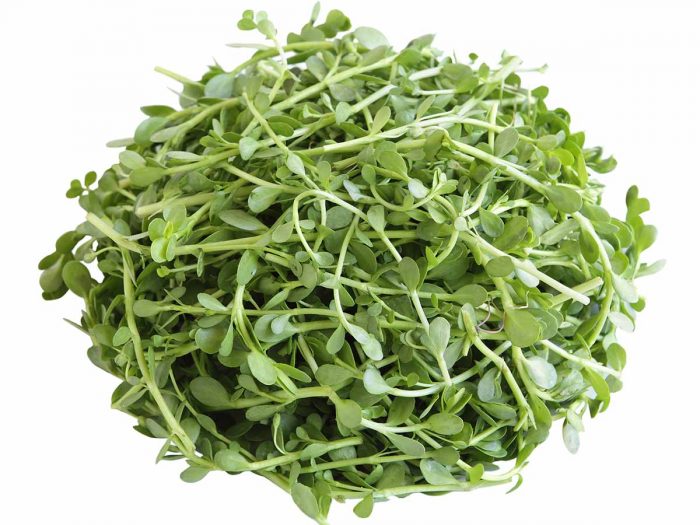The most unique and important health benefits of brahmi include its ability to improve cognitive ability, relieve stress, regulate blood sugar levels, and treat respiratory conditions. It also helps enhance the digestive process, protect against mental degeneration, boost the immune system, and lower inflammation.
What is Brahmi?
Brahmi (Bacopa monnieri) is a creeping, perennial herb has been praised in Ayurvedic and traditional medicines across the world for generations. You may know it by another name such as water hyssop or herb of grace, but brahmi is the most common name. It’s difficult to pinpoint an exact native for this wetland-growing herb and most experts agree that it has been growing wild in all six majorly inhabited continents for hundreds of thousands of years. Unlike many other herbs, brahmi has a range of unique health effects that have made it so desirable and cherished by global cultures. [1]
There are certain valuable alkaloids and triterpene saponins found in brahmi that have strong effects on the body, in addition to many other organic compounds and volatile constituents. It is commonly used fresh as a salad ingredient, but the herb can also be dried and ground and used with other herbs. The flavor is relatively mild, but the real reason for using brahmi is for the impact that it has on human health.

Health Benefits of Brahmi
Let’s take a closer look at the unique health benefits of this amazing Ayurvedic herb.
Boosts Cognition
One of the most prized benefits of brahmi is its ability to stimulate the mind, particularly in terms of memory and concentration. It has long been used in Ayurvedic medicine to increase focus and retention. Some of the organic compounds in brahmi stimulate cognitive pathways in the brain to boost cognitive ability, according to a study by Devendra, Patel Saurabh Shankar et al., 2018 (Journal of Pharmacognosy and Phytochemistry). [2] [3]
Relieves Stress
The leaves of the brahmi plant can be chewed (only 2-3 at a time) in order to relieve stress. The active ingredients in this herb can affect hormonal balance in the body and positively impact the balance of stress hormones in our body, thereby inducing a calm, relaxed state in a natural way, avoiding the side effects of traditional pharmaceutical options for stress. [4]
Anti-inflammatory Capacity
When the leaves of the brahmi plant are rubbed topically on affected parts of the body, the compounds released can reduce swelling and eliminate irritation, as well as inflammation inside the body as well. This is ideal for people suffering from arthritis, gout, and other inflammatory conditions. [5]
Improves Respiratory Health
When brahmi is brewed in a tea or chewed as normal leaves, it can boost your respiratory health. It has been used in Ayurvedic medicine for treating bronchitis, congestion, chest colds, and blocked sinuses. It can clear out excess phlegm and mucus and relieve the inflammation in the throat and respiratory tracts to provide you with rapid relief. [6]
Boosts Immunity
When consumed in any form, tea, leaves, or otherwise, brahmi can give the immune system a necessary boost. The nutrients are supplemented by the antioxidant compounds to increase the response time of our immune system against pathogens, viruses or bacterial infection. [7]
Helpful in Treating Epilepsy
The leaves of brahmi have been used as a treatment for epilepsy for thousands of years. This is thought to be due to the effect the herb has on neural pathways. It helps to prevent epileptic seizures, as well as other forms of mental diseases. [8]
Skin Care
If you want to speed up wound healing and disinfect the skin at the same time, spread brahmi juice or oil on the affected area. It can reduce the appearance of scarring and leave you with smooth, healthy skin enriched with its natural essential oils. [9]
Regulates Blood Sugar Levels
In a 2015 research study based on a rat model published in the Journal of Chemical and Pharmaceutical Research, brahmi has been linked to regulating blood sugar levels as it has an antihyperglycemic effect. When diabetic rats were administered with 500 mg of brahmi for 30 days, a significant reduction was seen in their sugar levels. So depending on the type of your diabetes condition, it may be able to help improve your symptoms of hypoglycemia and allow you to live a normal, healthy life. [10]
Treats Digestive Issues
Brahmi is a sedative and soothing herb, as well as anti-inflammatory and may help in providing relief from gastrointestinal conditions such as ulcers, etc. [11]
Note on Dosage: Therapeutic doses of Brahmi are not associated with any known side effects, and Bacopa has been used safely in Ayurvedic medicine for several hundred years. Traditional daily doses of Bacopa are 5- 10 g of non-standardized powder, 8-16 mL of infusion, and 30 mL daily of syrup (Brahmi).
Word of Caution: Long-term use of any herbal supplement is usually discouraged and brahmi is no exception. Regular use for more than 12 weeks is discouraged, so it should only be used when you need it to alleviate a certain symptom or illness. Also, due to its effects on the respiratory system, urinary tract system, cardiovascular system, and blood sugar levels, you should consult a doctor if you suffer from asthma, urinary tract infections, a reduced heart rate or hyperglycemia. Other than those concerns, this herb is not considered to be a naturally allergenic food.
